University of Hail: NURS 501 - Critique of Leininger's Nursing Theory
VerifiedAdded on 2022/09/13
|8
|1834
|16
Essay
AI Summary
This assignment provides a comprehensive critique of Madeleine Leininger's Culture Care Diversity and Universality Theory, focusing on its application within the context of nursing. The paper begins with an introduction to the theory, which emphasizes the importance of understanding diverse cultures and their impact on healthcare practices. It then delves into the structure and function of the theory, evaluating its clarity, consistency, and simplicity. The assignment also includes an analysis of the theory's visual representation through the Sunrise Model and its logical representation, assessing the model's clarity and effectiveness. Furthermore, the critique explores the theory's origins and influences, including Leininger's personal experiences and the impact of the Second World War. The paper concludes by highlighting the significance of Leininger's theory in shaping nursing care, particularly in the context of cultural diversity and the nurse-patient relationship. The student provides a detailed overview of the theory, its components, and its relevance in contemporary nursing practice, offering valuable insights into its strengths and limitations.
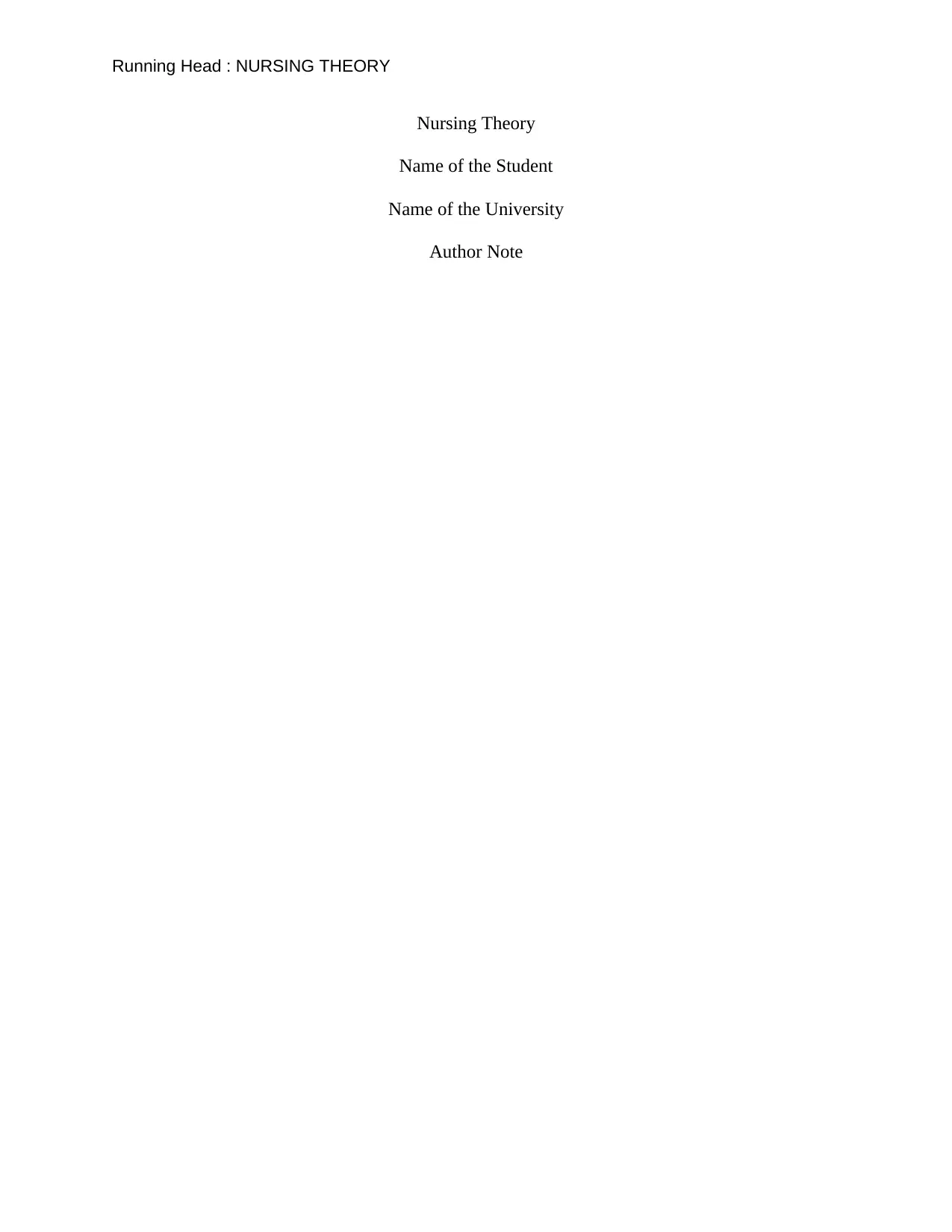
Running Head : NURSING THEORY
Nursing Theory
Name of the Student
Name of the University
Author Note
Nursing Theory
Name of the Student
Name of the University
Author Note
Paraphrase This Document
Need a fresh take? Get an instant paraphrase of this document with our AI Paraphraser
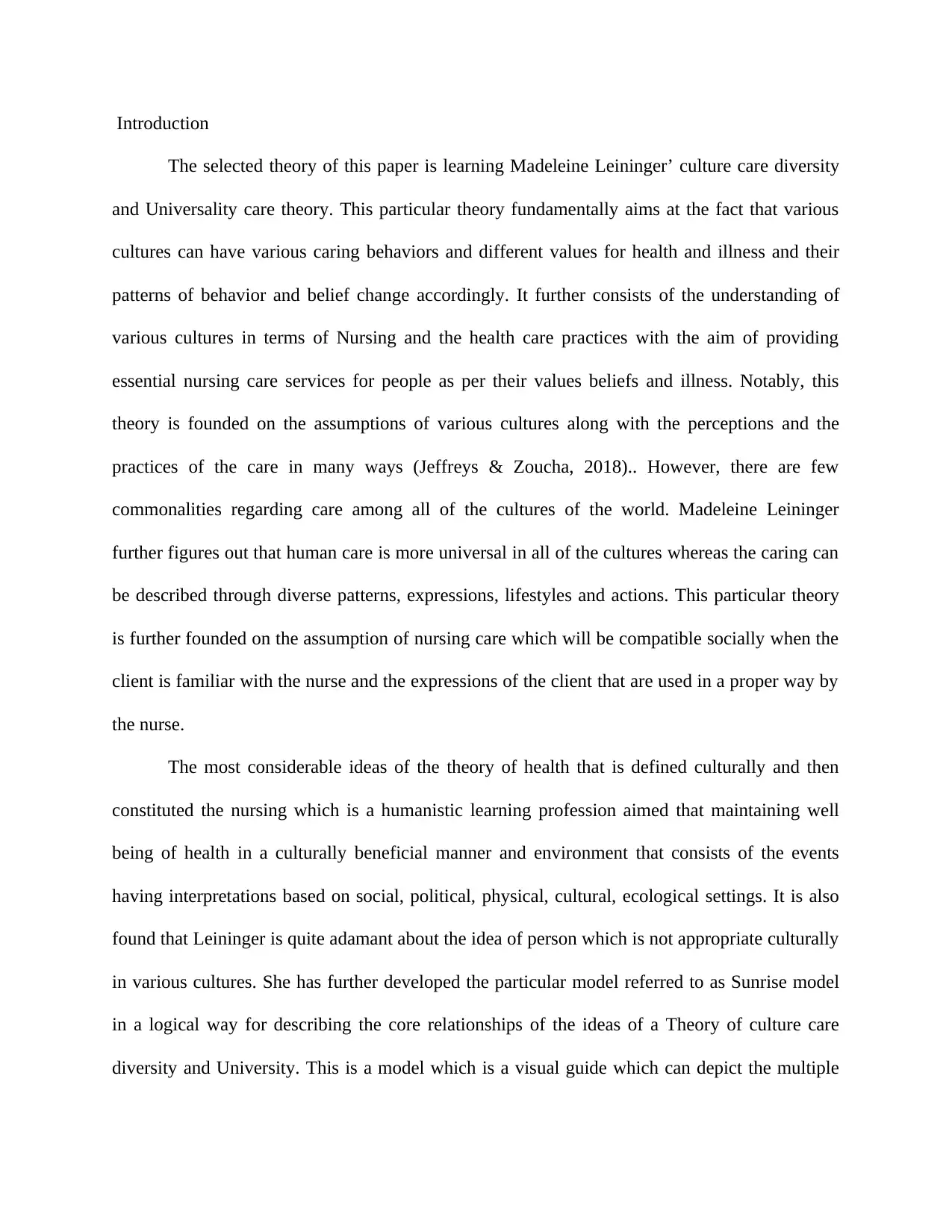
Introduction
The selected theory of this paper is learning Madeleine Leininger’ culture care diversity
and Universality care theory. This particular theory fundamentally aims at the fact that various
cultures can have various caring behaviors and different values for health and illness and their
patterns of behavior and belief change accordingly. It further consists of the understanding of
various cultures in terms of Nursing and the health care practices with the aim of providing
essential nursing care services for people as per their values beliefs and illness. Notably, this
theory is founded on the assumptions of various cultures along with the perceptions and the
practices of the care in many ways (Jeffreys & Zoucha, 2018).. However, there are few
commonalities regarding care among all of the cultures of the world. Madeleine Leininger
further figures out that human care is more universal in all of the cultures whereas the caring can
be described through diverse patterns, expressions, lifestyles and actions. This particular theory
is further founded on the assumption of nursing care which will be compatible socially when the
client is familiar with the nurse and the expressions of the client that are used in a proper way by
the nurse.
The most considerable ideas of the theory of health that is defined culturally and then
constituted the nursing which is a humanistic learning profession aimed that maintaining well
being of health in a culturally beneficial manner and environment that consists of the events
having interpretations based on social, political, physical, cultural, ecological settings. It is also
found that Leininger is quite adamant about the idea of person which is not appropriate culturally
in various cultures. She has further developed the particular model referred to as Sunrise model
in a logical way for describing the core relationships of the ideas of a Theory of culture care
diversity and University. This is a model which is a visual guide which can depict the multiple
The selected theory of this paper is learning Madeleine Leininger’ culture care diversity
and Universality care theory. This particular theory fundamentally aims at the fact that various
cultures can have various caring behaviors and different values for health and illness and their
patterns of behavior and belief change accordingly. It further consists of the understanding of
various cultures in terms of Nursing and the health care practices with the aim of providing
essential nursing care services for people as per their values beliefs and illness. Notably, this
theory is founded on the assumptions of various cultures along with the perceptions and the
practices of the care in many ways (Jeffreys & Zoucha, 2018).. However, there are few
commonalities regarding care among all of the cultures of the world. Madeleine Leininger
further figures out that human care is more universal in all of the cultures whereas the caring can
be described through diverse patterns, expressions, lifestyles and actions. This particular theory
is further founded on the assumption of nursing care which will be compatible socially when the
client is familiar with the nurse and the expressions of the client that are used in a proper way by
the nurse.
The most considerable ideas of the theory of health that is defined culturally and then
constituted the nursing which is a humanistic learning profession aimed that maintaining well
being of health in a culturally beneficial manner and environment that consists of the events
having interpretations based on social, political, physical, cultural, ecological settings. It is also
found that Leininger is quite adamant about the idea of person which is not appropriate culturally
in various cultures. She has further developed the particular model referred to as Sunrise model
in a logical way for describing the core relationships of the ideas of a Theory of culture care
diversity and University. This is a model which is a visual guide which can depict the multiple
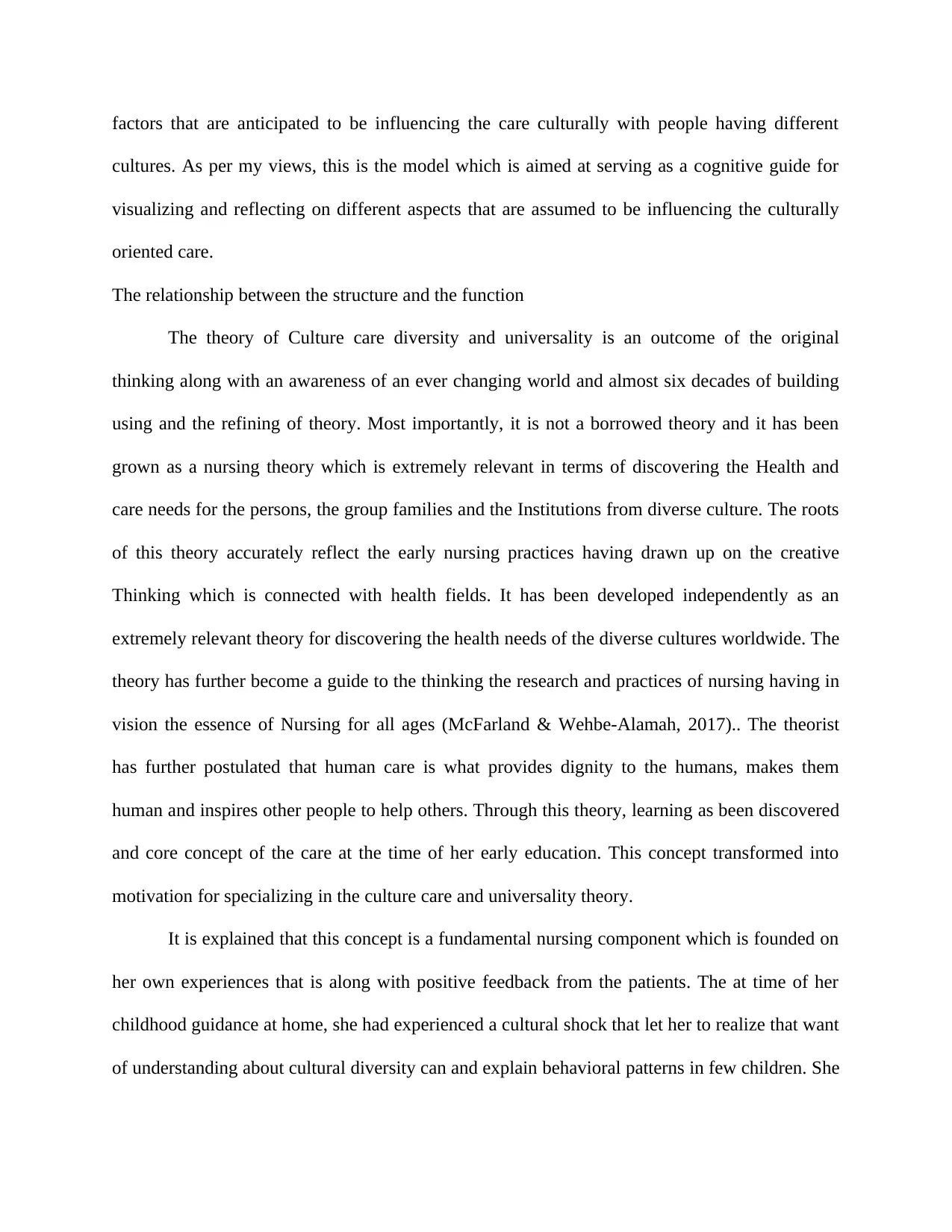
factors that are anticipated to be influencing the care culturally with people having different
cultures. As per my views, this is the model which is aimed at serving as a cognitive guide for
visualizing and reflecting on different aspects that are assumed to be influencing the culturally
oriented care.
The relationship between the structure and the function
The theory of Culture care diversity and universality is an outcome of the original
thinking along with an awareness of an ever changing world and almost six decades of building
using and the refining of theory. Most importantly, it is not a borrowed theory and it has been
grown as a nursing theory which is extremely relevant in terms of discovering the Health and
care needs for the persons, the group families and the Institutions from diverse culture. The roots
of this theory accurately reflect the early nursing practices having drawn up on the creative
Thinking which is connected with health fields. It has been developed independently as an
extremely relevant theory for discovering the health needs of the diverse cultures worldwide. The
theory has further become a guide to the thinking the research and practices of nursing having in
vision the essence of Nursing for all ages (McFarland & Wehbe-Alamah, 2017).. The theorist
has further postulated that human care is what provides dignity to the humans, makes them
human and inspires other people to help others. Through this theory, learning as been discovered
and core concept of the care at the time of her early education. This concept transformed into
motivation for specializing in the culture care and universality theory.
It is explained that this concept is a fundamental nursing component which is founded on
her own experiences that is along with positive feedback from the patients. The at time of her
childhood guidance at home, she had experienced a cultural shock that let her to realize that want
of understanding about cultural diversity can and explain behavioral patterns in few children. She
cultures. As per my views, this is the model which is aimed at serving as a cognitive guide for
visualizing and reflecting on different aspects that are assumed to be influencing the culturally
oriented care.
The relationship between the structure and the function
The theory of Culture care diversity and universality is an outcome of the original
thinking along with an awareness of an ever changing world and almost six decades of building
using and the refining of theory. Most importantly, it is not a borrowed theory and it has been
grown as a nursing theory which is extremely relevant in terms of discovering the Health and
care needs for the persons, the group families and the Institutions from diverse culture. The roots
of this theory accurately reflect the early nursing practices having drawn up on the creative
Thinking which is connected with health fields. It has been developed independently as an
extremely relevant theory for discovering the health needs of the diverse cultures worldwide. The
theory has further become a guide to the thinking the research and practices of nursing having in
vision the essence of Nursing for all ages (McFarland & Wehbe-Alamah, 2017).. The theorist
has further postulated that human care is what provides dignity to the humans, makes them
human and inspires other people to help others. Through this theory, learning as been discovered
and core concept of the care at the time of her early education. This concept transformed into
motivation for specializing in the culture care and universality theory.
It is explained that this concept is a fundamental nursing component which is founded on
her own experiences that is along with positive feedback from the patients. The at time of her
childhood guidance at home, she had experienced a cultural shock that let her to realize that want
of understanding about cultural diversity can and explain behavioral patterns in few children. She
⊘ This is a preview!⊘
Do you want full access?
Subscribe today to unlock all pages.

Trusted by 1+ million students worldwide
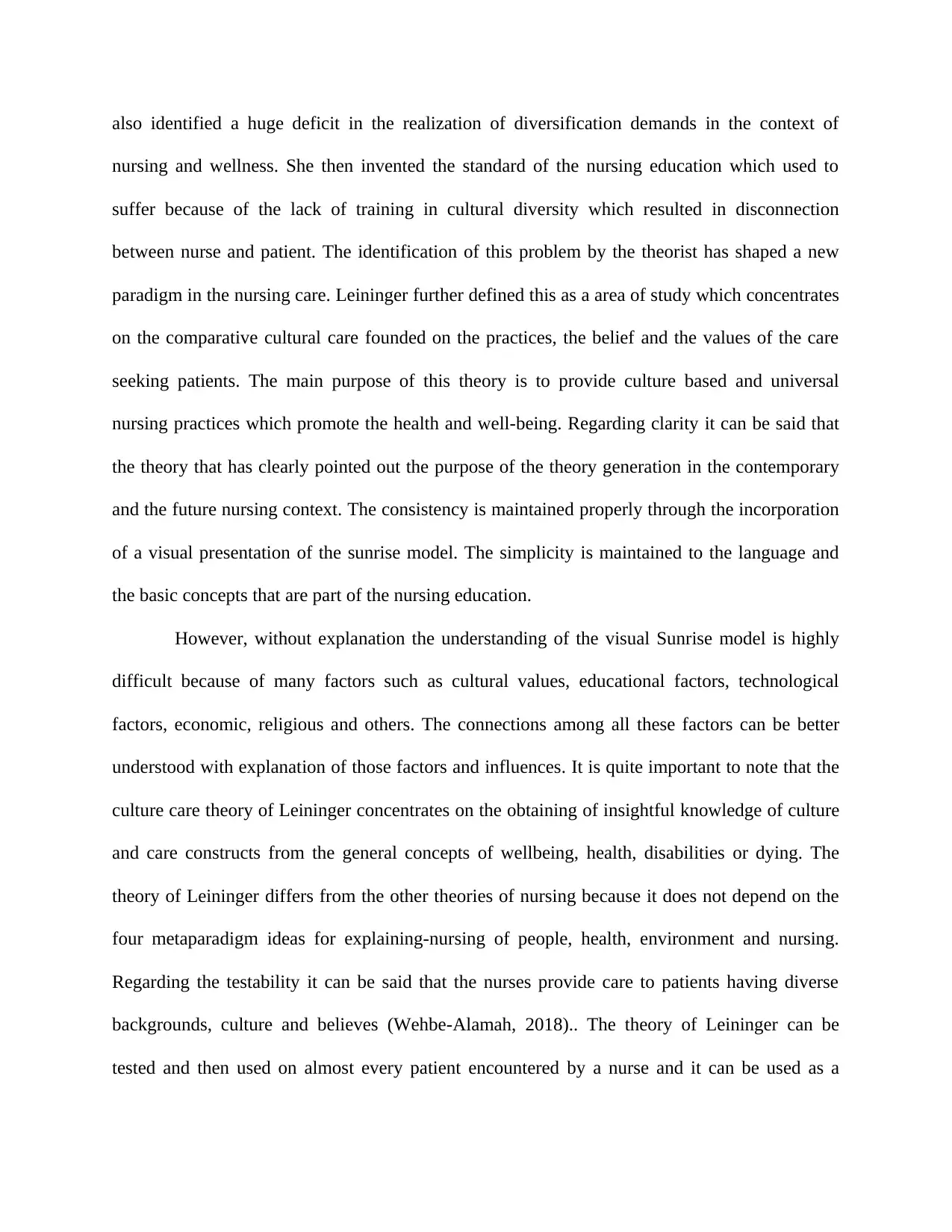
also identified a huge deficit in the realization of diversification demands in the context of
nursing and wellness. She then invented the standard of the nursing education which used to
suffer because of the lack of training in cultural diversity which resulted in disconnection
between nurse and patient. The identification of this problem by the theorist has shaped a new
paradigm in the nursing care. Leininger further defined this as a area of study which concentrates
on the comparative cultural care founded on the practices, the belief and the values of the care
seeking patients. The main purpose of this theory is to provide culture based and universal
nursing practices which promote the health and well-being. Regarding clarity it can be said that
the theory that has clearly pointed out the purpose of the theory generation in the contemporary
and the future nursing context. The consistency is maintained properly through the incorporation
of a visual presentation of the sunrise model. The simplicity is maintained to the language and
the basic concepts that are part of the nursing education.
However, without explanation the understanding of the visual Sunrise model is highly
difficult because of many factors such as cultural values, educational factors, technological
factors, economic, religious and others. The connections among all these factors can be better
understood with explanation of those factors and influences. It is quite important to note that the
culture care theory of Leininger concentrates on the obtaining of insightful knowledge of culture
and care constructs from the general concepts of wellbeing, health, disabilities or dying. The
theory of Leininger differs from the other theories of nursing because it does not depend on the
four metaparadigm ideas for explaining-nursing of people, health, environment and nursing.
Regarding the testability it can be said that the nurses provide care to patients having diverse
backgrounds, culture and believes (Wehbe-Alamah, 2018).. The theory of Leininger can be
tested and then used on almost every patient encountered by a nurse and it can be used as a
nursing and wellness. She then invented the standard of the nursing education which used to
suffer because of the lack of training in cultural diversity which resulted in disconnection
between nurse and patient. The identification of this problem by the theorist has shaped a new
paradigm in the nursing care. Leininger further defined this as a area of study which concentrates
on the comparative cultural care founded on the practices, the belief and the values of the care
seeking patients. The main purpose of this theory is to provide culture based and universal
nursing practices which promote the health and well-being. Regarding clarity it can be said that
the theory that has clearly pointed out the purpose of the theory generation in the contemporary
and the future nursing context. The consistency is maintained properly through the incorporation
of a visual presentation of the sunrise model. The simplicity is maintained to the language and
the basic concepts that are part of the nursing education.
However, without explanation the understanding of the visual Sunrise model is highly
difficult because of many factors such as cultural values, educational factors, technological
factors, economic, religious and others. The connections among all these factors can be better
understood with explanation of those factors and influences. It is quite important to note that the
culture care theory of Leininger concentrates on the obtaining of insightful knowledge of culture
and care constructs from the general concepts of wellbeing, health, disabilities or dying. The
theory of Leininger differs from the other theories of nursing because it does not depend on the
four metaparadigm ideas for explaining-nursing of people, health, environment and nursing.
Regarding the testability it can be said that the nurses provide care to patients having diverse
backgrounds, culture and believes (Wehbe-Alamah, 2018).. The theory of Leininger can be
tested and then used on almost every patient encountered by a nurse and it can be used as a
Paraphrase This Document
Need a fresh take? Get an instant paraphrase of this document with our AI Paraphraser
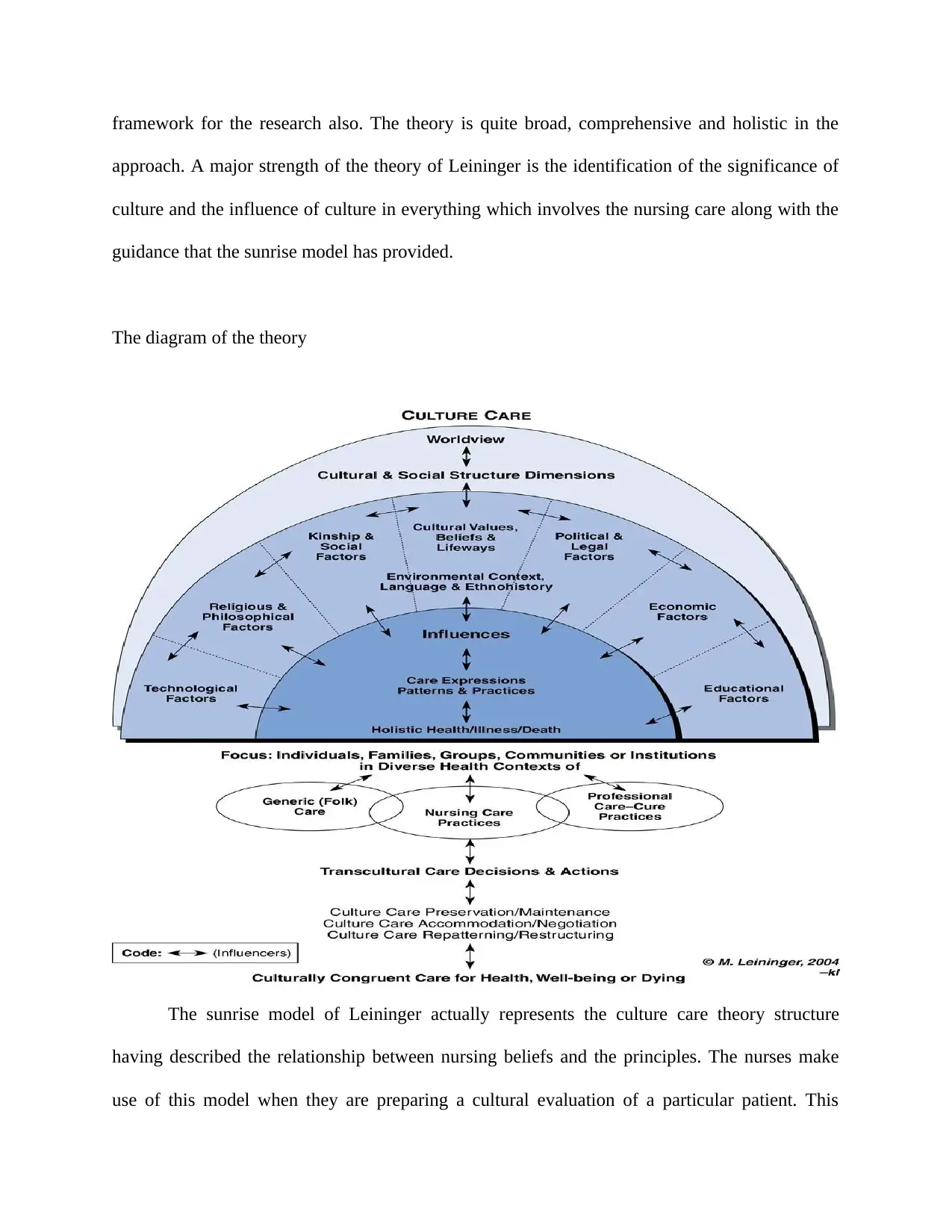
framework for the research also. The theory is quite broad, comprehensive and holistic in the
approach. A major strength of the theory of Leininger is the identification of the significance of
culture and the influence of culture in everything which involves the nursing care along with the
guidance that the sunrise model has provided.
The diagram of the theory
The sunrise model of Leininger actually represents the culture care theory structure
having described the relationship between nursing beliefs and the principles. The nurses make
use of this model when they are preparing a cultural evaluation of a particular patient. This
approach. A major strength of the theory of Leininger is the identification of the significance of
culture and the influence of culture in everything which involves the nursing care along with the
guidance that the sunrise model has provided.
The diagram of the theory
The sunrise model of Leininger actually represents the culture care theory structure
having described the relationship between nursing beliefs and the principles. The nurses make
use of this model when they are preparing a cultural evaluation of a particular patient. This
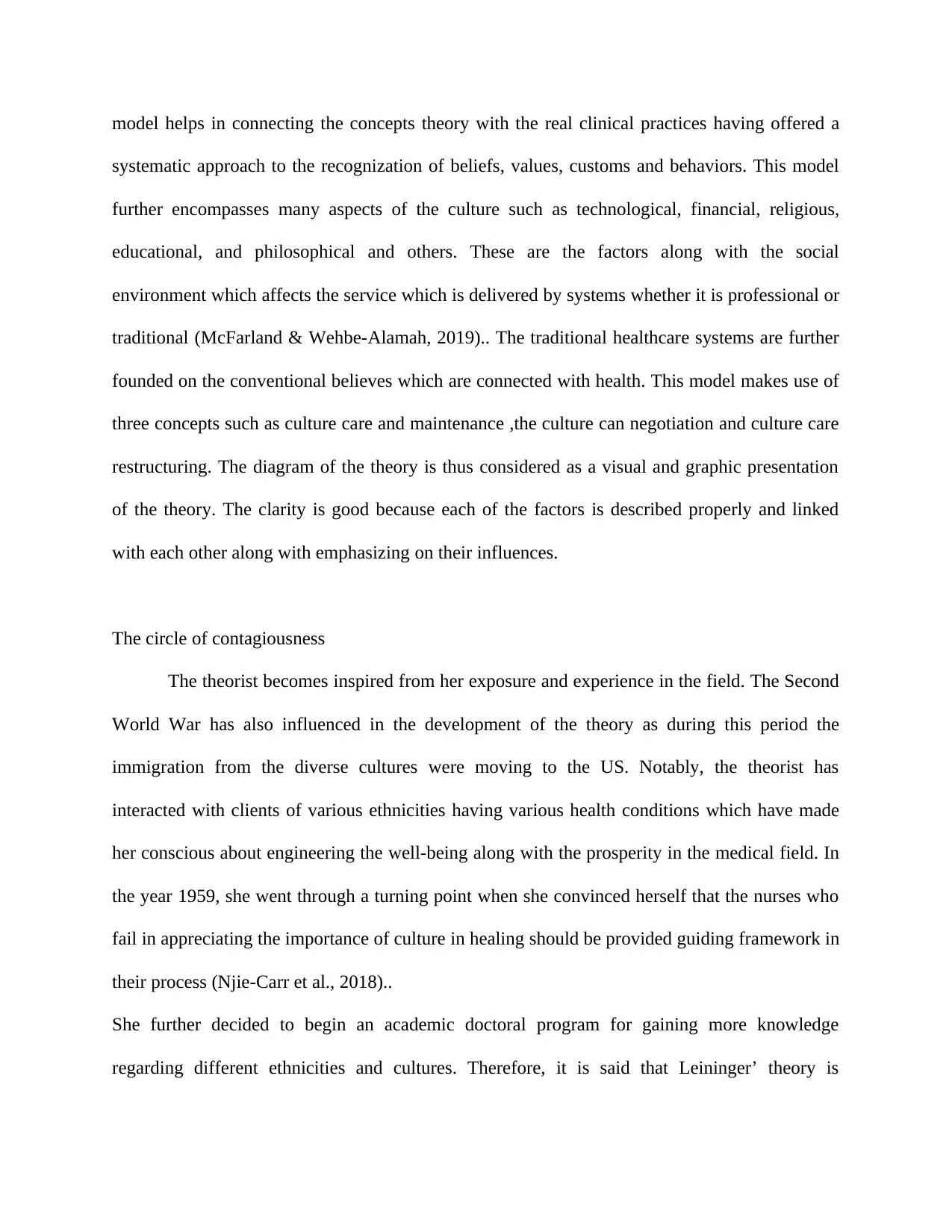
model helps in connecting the concepts theory with the real clinical practices having offered a
systematic approach to the recognization of beliefs, values, customs and behaviors. This model
further encompasses many aspects of the culture such as technological, financial, religious,
educational, and philosophical and others. These are the factors along with the social
environment which affects the service which is delivered by systems whether it is professional or
traditional (McFarland & Wehbe-Alamah, 2019).. The traditional healthcare systems are further
founded on the conventional believes which are connected with health. This model makes use of
three concepts such as culture care and maintenance ,the culture can negotiation and culture care
restructuring. The diagram of the theory is thus considered as a visual and graphic presentation
of the theory. The clarity is good because each of the factors is described properly and linked
with each other along with emphasizing on their influences.
The circle of contagiousness
The theorist becomes inspired from her exposure and experience in the field. The Second
World War has also influenced in the development of the theory as during this period the
immigration from the diverse cultures were moving to the US. Notably, the theorist has
interacted with clients of various ethnicities having various health conditions which have made
her conscious about engineering the well-being along with the prosperity in the medical field. In
the year 1959, she went through a turning point when she convinced herself that the nurses who
fail in appreciating the importance of culture in healing should be provided guiding framework in
their process (Njie-Carr et al., 2018)..
She further decided to begin an academic doctoral program for gaining more knowledge
regarding different ethnicities and cultures. Therefore, it is said that Leininger’ theory is
systematic approach to the recognization of beliefs, values, customs and behaviors. This model
further encompasses many aspects of the culture such as technological, financial, religious,
educational, and philosophical and others. These are the factors along with the social
environment which affects the service which is delivered by systems whether it is professional or
traditional (McFarland & Wehbe-Alamah, 2019).. The traditional healthcare systems are further
founded on the conventional believes which are connected with health. This model makes use of
three concepts such as culture care and maintenance ,the culture can negotiation and culture care
restructuring. The diagram of the theory is thus considered as a visual and graphic presentation
of the theory. The clarity is good because each of the factors is described properly and linked
with each other along with emphasizing on their influences.
The circle of contagiousness
The theorist becomes inspired from her exposure and experience in the field. The Second
World War has also influenced in the development of the theory as during this period the
immigration from the diverse cultures were moving to the US. Notably, the theorist has
interacted with clients of various ethnicities having various health conditions which have made
her conscious about engineering the well-being along with the prosperity in the medical field. In
the year 1959, she went through a turning point when she convinced herself that the nurses who
fail in appreciating the importance of culture in healing should be provided guiding framework in
their process (Njie-Carr et al., 2018)..
She further decided to begin an academic doctoral program for gaining more knowledge
regarding different ethnicities and cultures. Therefore, it is said that Leininger’ theory is
⊘ This is a preview!⊘
Do you want full access?
Subscribe today to unlock all pages.

Trusted by 1+ million students worldwide
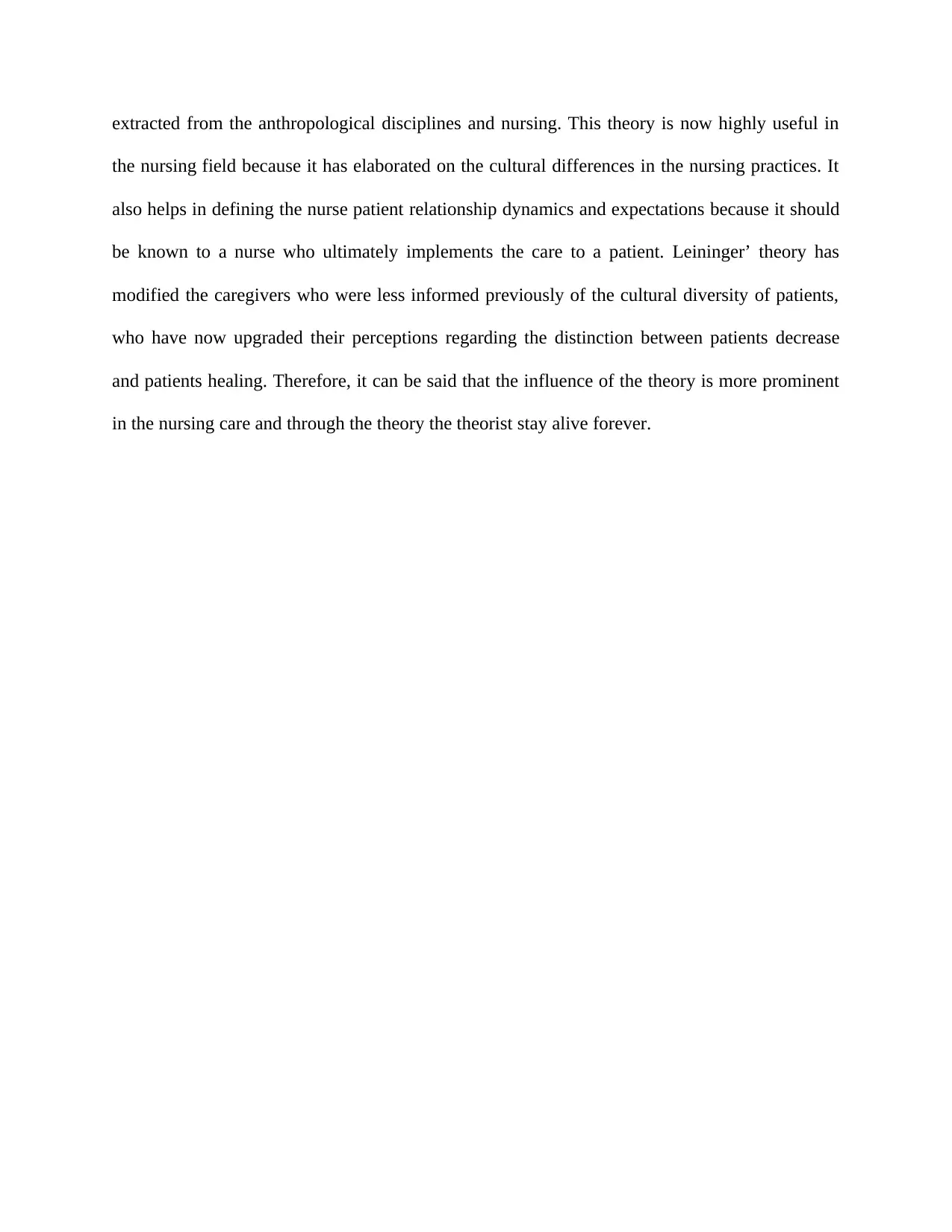
extracted from the anthropological disciplines and nursing. This theory is now highly useful in
the nursing field because it has elaborated on the cultural differences in the nursing practices. It
also helps in defining the nurse patient relationship dynamics and expectations because it should
be known to a nurse who ultimately implements the care to a patient. Leininger’ theory has
modified the caregivers who were less informed previously of the cultural diversity of patients,
who have now upgraded their perceptions regarding the distinction between patients decrease
and patients healing. Therefore, it can be said that the influence of the theory is more prominent
in the nursing care and through the theory the theorist stay alive forever.
the nursing field because it has elaborated on the cultural differences in the nursing practices. It
also helps in defining the nurse patient relationship dynamics and expectations because it should
be known to a nurse who ultimately implements the care to a patient. Leininger’ theory has
modified the caregivers who were less informed previously of the cultural diversity of patients,
who have now upgraded their perceptions regarding the distinction between patients decrease
and patients healing. Therefore, it can be said that the influence of the theory is more prominent
in the nursing care and through the theory the theorist stay alive forever.
Paraphrase This Document
Need a fresh take? Get an instant paraphrase of this document with our AI Paraphraser
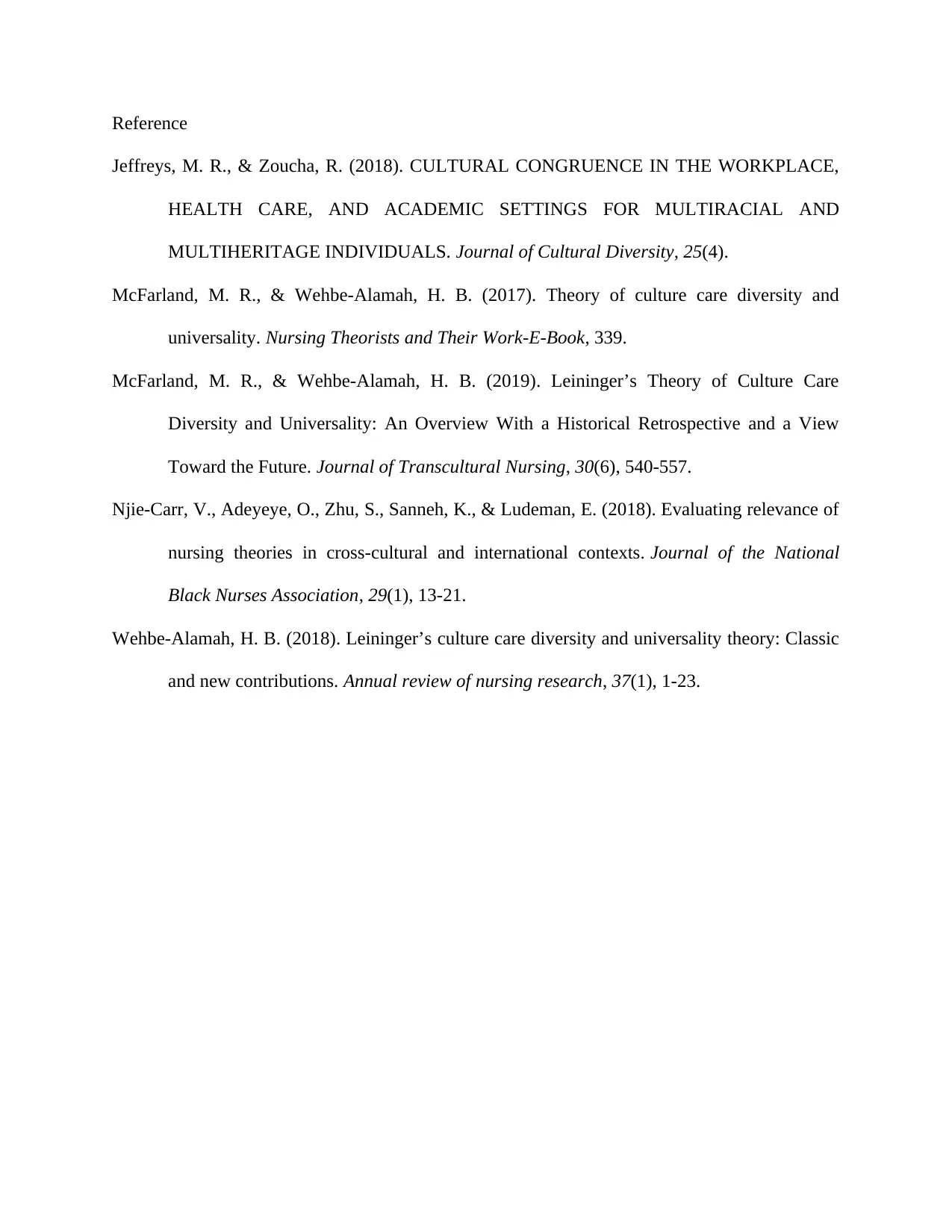
Reference
Jeffreys, M. R., & Zoucha, R. (2018). CULTURAL CONGRUENCE IN THE WORKPLACE,
HEALTH CARE, AND ACADEMIC SETTINGS FOR MULTIRACIAL AND
MULTIHERITAGE INDIVIDUALS. Journal of Cultural Diversity, 25(4).
McFarland, M. R., & Wehbe-Alamah, H. B. (2017). Theory of culture care diversity and
universality. Nursing Theorists and Their Work-E-Book, 339.
McFarland, M. R., & Wehbe-Alamah, H. B. (2019). Leininger’s Theory of Culture Care
Diversity and Universality: An Overview With a Historical Retrospective and a View
Toward the Future. Journal of Transcultural Nursing, 30(6), 540-557.
Njie-Carr, V., Adeyeye, O., Zhu, S., Sanneh, K., & Ludeman, E. (2018). Evaluating relevance of
nursing theories in cross-cultural and international contexts. Journal of the National
Black Nurses Association, 29(1), 13-21.
Wehbe-Alamah, H. B. (2018). Leininger’s culture care diversity and universality theory: Classic
and new contributions. Annual review of nursing research, 37(1), 1-23.
Jeffreys, M. R., & Zoucha, R. (2018). CULTURAL CONGRUENCE IN THE WORKPLACE,
HEALTH CARE, AND ACADEMIC SETTINGS FOR MULTIRACIAL AND
MULTIHERITAGE INDIVIDUALS. Journal of Cultural Diversity, 25(4).
McFarland, M. R., & Wehbe-Alamah, H. B. (2017). Theory of culture care diversity and
universality. Nursing Theorists and Their Work-E-Book, 339.
McFarland, M. R., & Wehbe-Alamah, H. B. (2019). Leininger’s Theory of Culture Care
Diversity and Universality: An Overview With a Historical Retrospective and a View
Toward the Future. Journal of Transcultural Nursing, 30(6), 540-557.
Njie-Carr, V., Adeyeye, O., Zhu, S., Sanneh, K., & Ludeman, E. (2018). Evaluating relevance of
nursing theories in cross-cultural and international contexts. Journal of the National
Black Nurses Association, 29(1), 13-21.
Wehbe-Alamah, H. B. (2018). Leininger’s culture care diversity and universality theory: Classic
and new contributions. Annual review of nursing research, 37(1), 1-23.
1 out of 8
Related Documents
Your All-in-One AI-Powered Toolkit for Academic Success.
+13062052269
info@desklib.com
Available 24*7 on WhatsApp / Email
![[object Object]](/_next/static/media/star-bottom.7253800d.svg)
Unlock your academic potential
Copyright © 2020–2025 A2Z Services. All Rights Reserved. Developed and managed by ZUCOL.





